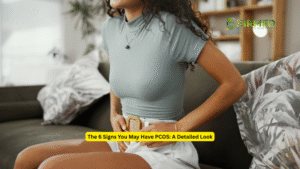6 Signs You May Have PCOS

6 Signs You May Have PCOS
6 signs you may have PCOS – if you’re noticing changes in your body that seem out of the ordinary, you might be experiencing this common condition. Polycystic ovary syndrome, or PCOS, affects millions of women worldwide and can impact everything from your menstrual cycle to your fertility. At EIRMED, we specialize in fertility and infertility solutions, offering products tailored for female fertility needs. This article dives deep into the signs, causes, and ways to manage PCOS, helping you understand if it’s time to take action.
What is Polycystic Ovary Syndrome (PCOS)?
Polycystic ovary syndrome is a hormonal disorder that disrupts the balance in your reproductive system. It often leads to small cysts on the ovaries, but not always – the name can be misleading. PCOS is one of the leading causes of infertility in women, making it harder to ovulate regularly. If you’re dealing with PCOS symptoms in women like irregular cycles or unwanted hair, you’re not alone. This condition affects about 1 in 10 women of childbearing age, according to reliable health sources.
The ovaries produce hormones like estrogen and progesterone, but in PCOS, there’s an overproduction of androgens, which are typically male hormones. This imbalance can cause a range of issues, from metabolic problems to emotional challenges. Early signs of PCOS often appear in your teens or early 20s, but many women don’t get diagnosed until they’re trying to conceive. At EIRMED, we see how PCOS ties into fertility struggles, and our products, such as fertility supplements, can support hormone balance.
Understanding PCOS starts with recognizing its effects on your body. It’s linked to insulin resistance, where your cells don’t respond well to insulin, leading to higher blood sugar levels. Over time, this can increase risks for type 2 diabetes, heart disease, and high blood pressure. But the good news is that with awareness and management, you can reduce these risks and improve your quality of life.
The 6 Signs You May Have PCOS: A Detailed Look
 If you’re wondering about the 6 signs you may have PCOS, let’s break them down. These are the most common indicators, based on expert insights from fertility clinics and health organizations. Remember, not everyone experiences all signs, and severity varies. If several resonate with you, consult a doctor for a proper check.
If you’re wondering about the 6 signs you may have PCOS, let’s break them down. These are the most common indicators, based on expert insights from fertility clinics and health organizations. Remember, not everyone experiences all signs, and severity varies. If several resonate with you, consult a doctor for a proper check.
Sign 1: Irregular or Absent Periods
One of the top PCOS irregular periods signs is cycles that are unpredictable. You might go months without a period, or they could be very light or heavy when they do come. This happens because PCOS interferes with ovulation – the process where your ovary releases an egg each month.
Without regular ovulation, your uterine lining builds up, leading to heavier bleeding or spotting between periods. If your cycles are longer than 35 days or you have fewer than eight periods a year, this could point to PCOS. Many women with this sign also face fertility challenges, as consistent ovulation is key to conception. At EIRMED, our female fertility treatments can help regulate cycles with targeted supplements.
Sign 2: Excess Hair Growth (Hirsutism)
Notice extra hair on your face, chest, back, or stomach? This is hirsutism, driven by high androgen levels in PCOS. It’s one of the more visible early signs of PCOS and can affect your confidence.
Androgens stimulate hair follicles in areas where men typically grow hair. About 70% of women with PCOS experience this, per studies from leading fertility centers. It might start subtly but can worsen without management. Laser treatments or medications can help, and lifestyle changes like weight control often reduce it.
Sign 3: Persistent Acne or Oily Skin
Acne that sticks around past your teens could be among the 6 signs you may have PCOS. High androgens increase oil production in your skin, leading to clogged pores and breakouts on your face, chest, or back.
Unlike typical acne, PCOS-related spots are often cystic and painful. You might also have oily skin or scalp. Hormonal treatments, like birth control pills, can balance this, but natural options like a low-glycemic diet work too. If over-the-counter products aren’t helping, it might be time to explore PCOS testing.
Sign 4: Weight Gain or Difficulty Losing Weight
Struggling with weight, especially around your midsection? Insulin resistance in PCOS makes it harder for your body to use sugar efficiently, leading to fat storage. Many women gain weight without changing their habits.
This abdominal weight gain increases risks for metabolic issues. Even a 5-10% weight loss can improve symptoms, studies show. Exercise and a balanced diet are crucial – think whole foods over processed ones. EIRMED offers fertility products that support metabolic health for women with PCOS.
Sign 5: Hair Thinning or Loss on the Scalp
Thinning hair on your head, similar to male-pattern baldness, is another sign. High androgens can shrink hair follicles, causing hair to fall out or grow finer.
This often starts at the crown or temples. It’s distressing, but treatments like minoxidil or anti-androgen meds can help. Nutritional support, including biotin-rich supplements from EIRMED, may strengthen hair.
Sign 6: Dark Patches on Skin (Acanthosis Nigricans)
Dark, velvety patches on your neck, armpits, or under breasts signal insulin resistance, common in PCOS. This skin change, called acanthosis nigricans, affects up to half of women with the condition.
It’s a visual clue to metabolic issues. Managing blood sugar through diet can fade these patches over time.
These 6 signs you may have PCOS often overlap, creating a cycle of symptoms. Tracking them in a journal can help when talking to your doctor.
Causes and Risk Factors of PCOS
What triggers PCOS? Genetics play a big role – if your mother or sister has it, your risk rises. Insulin resistance is another key factor, affecting up to 70% of cases. High insulin boosts androgen production, worsening symptoms.
Environmental factors like diet and stress contribute too. Obesity can amplify PCOS, but lean women get it as well. Hormonal imbalances start in the brain, where signals to the ovaries go awry.
Risk factors include family history, type 2 diabetes, and low birth weight. Early detection through blood tests for hormones and ultrasound for ovaries is essential.
How PCOS Affects Fertility
PCOS is a top cause of infertility due to irregular ovulation. Without consistent egg release, conception is tough. Many women turn to fertility treatments like clomiphene or IVF.
At EIRMED, we provide products for female fertility, including ovulation kits and supplements to support hormone balance. Lifestyle changes can restore ovulation in some cases.
Diagnosis of PCOS
Diagnosing PCOS involves ruling out other conditions. Your doctor may use the Rotterdam criteria: two of three – irregular periods, high androgens, polycystic ovaries on ultrasound.
Blood tests check hormones, cholesterol, and glucose. A pelvic ultrasound looks for cysts. Early diagnosis prevents complications like diabetes.
Treatment Options for PCOS
There’s no cure, but treatments manage symptoms effectively. Lifestyle is first: aim for balanced meals and 150 minutes of exercise weekly.
Medications include:
– Birth control for cycle regulation and acne.
– Metformin for insulin resistance.
– Anti-androgens for hair issues.
For fertility, letrozole or gonadotropins help ovulation. Surgery like ovarian drilling is rare.
EIRMED’s fertility products, like herbal supplements, complement these for natural support.
Lifestyle Tips to Manage PCOS Symptoms
Daily habits make a difference. Focus on a PCOS-friendly diet: high fiber, lean proteins, healthy fats. Avoid sugary foods to control insulin.
Exercise mixes cardio and strength training. Stress management via yoga or meditation helps hormone balance.
Sleep 7-9 hours nightly – poor sleep worsens insulin resistance.
Related Conditions and Long-Term Risks
PCOS links to endometriosis, thyroid issues, and anxiety. Long-term, watch for diabetes (50% risk by 40), heart disease, and endometrial cancer from irregular periods.
Regular check-ups are vital. Mental health support addresses mood swings or depression from symptoms.
FAQ
What are the early signs of PCOS?
Early signs include irregular periods, acne, and weight gain. If you notice these, see a doctor.
Can PCOS go away on its own?
No, but symptoms can improve with lifestyle changes and treatment.
How does PCOS affect pregnancy?
It can cause infertility, but many women conceive with help like medications or IVF.
Is diet important for PCOS?
Yes, a low-glycemic diet helps manage insulin and symptoms.
What tests confirm PCOS?
Blood tests for hormones and ultrasound for ovaries.
Thank You
Thank you for reading this guide on the 6 signs you may have PCOS. At EIRMED, we’re here to support your fertility journey with quality products. If this helped, share it or explore our site for more.
Overall Purpose
This article aims to educate women on recognizing PCOS through its key signs, like irregular periods and excess hair. By providing detailed info on causes, diagnosis, and management, it empowers you to seek timely help. Understanding PCOS can improve fertility and health, reducing risks like diabetes. With simple lifestyle tips and EIRMED’s support, you can live better – knowledge is your first step to wellness.
Disclaimer
This content is for informational purposes only and not a substitute for professional medical advice. Consult your healthcare provider for diagnosis or treatment. EIRMED products are not intended to cure PCOS but support fertility. Results vary; always check for allergies or interactions.

Eirmed is an informational platform dedicated to providing reliable, science-based insights on male and female fertility, reproductive health, and natural conception.

